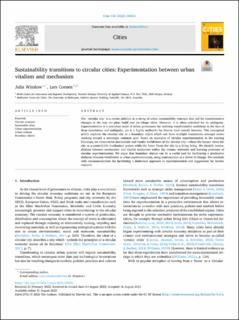Sustainability transitions to circular cities: Experimentation between urban vitalism and mechanism
Peer reviewed, Journal article
Published version
Permanent lenke
https://hdl.handle.net/11250/3091367Utgivelsesdato
2023Metadata
Vis full innførselSamlinger
Originalversjon
10.1016/j.cities.2023.104531Sammendrag
The “circular city” is a recent addition to a string of urban sustainability concepts that call for transformative changes in the way we plan, build and (re-)shape cities. However, it is often criticised for its ambiguity. Experimentation is a prevalent mode of urban governance for realising transformative ambitions in the face of deep uncertainty and ambiguity, yet it is highly malleable for diverse (and vested) interests. This conceptual article explores the circular city as a boundary object which can have multiple translations amongst actors working toward a seemingly common goal. Based on examples of circular experimentation in the existing literature, we characterise mechanistic and vitalist worldviews of the circular city—where the former views the city as a controllable mechanical system while the latter likens the city to a living being. We identify contradictions between mechanistic and vitalist tendencies within the visions, networks and learning processes of circular experimentation. We argue that boundary objects can be a useful tool for facilitating a productive dialectic between worldviews in urban experimentation, using contradiction as a driver of change. We conclude with recommendations for facilitating a dialectical approach to experimentation and suggestions for further research.

